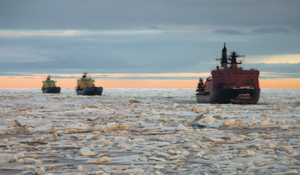Russia’s Ambitions in the Arctic Towards 2035

Speaker(s): Gustafsson, P. (Swedish Defence Research Agency [FOI])
Date: 15 February 2022
Speaker Session Summary
SMA hosted a speaker session with Dr. Pär Gustafsson (Swedish Defence Research Agency [FOI]) as part of its SMA EUCOM Speaker Series.
Russia is coveting the Arctic Circle’s wealth of undiscovered natural resources and the control of future Northern Sea trade routes that have strong military, trade, and socio-economic implications for all of Europe. Furthermore, control of the Arctic is a matter of Russian identity; Russia currently controls more Arctic land than any other country and has the largest geographic claim to the Arctic Circle. As climate change continues to melt the Arctic Circle’s ice, the Northern Sea Route will give Russia and northern European countries a much shorter line of transit for moving trade goods than the current route through the Suez Canal. Control of these new trade routes could vastly increase Russia’s economic prospects; as of right now Russia’s Arctic Zone already accounts for 12-15% percent of Russian GDP and 20% of Russian exports. Dr. Gustaffson commented that increased mobility by Russian military in the Arctic would have potential security concerns for countries on the Kola Peninsula, because Russia’s military access to their borders would increase.
Outlined in official defense documents relating to the Arctic Circle, Russia’s objectives include maintaining mutually beneficial bilateral and multilateral agreements, develop natural resources and economic growth, and protect overall Russian interests. The main motives for continued Arctic development identified by Russian leaders are attaining natural resources, socio-economic development, environmental protection, maintaining peace and stability, and creating the Northern Sea Route as a national transport lane. While there is opportunity for Russia in the Arctic Circle, Dr. Gustafsson commented that there are also several obstacles and threats to Russia’s Arctic goals, which include: a) decreasing population in the region, b) a lack of subsidies for businesses in Russia, and c) land and air transport in arctic conditions. However, Russia is still poised to gain massive amounts of access to resources, capitalize on new trade routes, and increase military mobility if the Arctic Circle continues to melt.
Comments